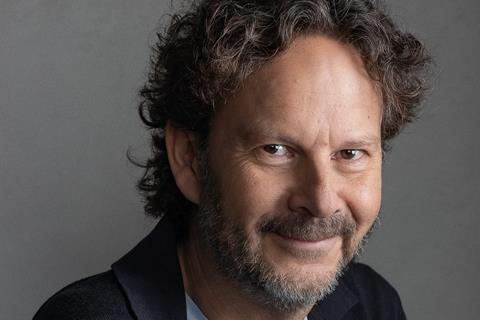
When Rian Johnson and his producing partner Ram Bergman first embarked on Knives Out, most agree they were taking a risk – after all, any recent precedents for a whodunnit murder mystery based on original intellectual property were hard to point to.
Following Knives Out’s $313m worldwide cinema gross, you might think the pressure was off for any sequel: there was now a proven audience for an ingenious murder mystery, written and directed by Johnson, and featuring Daniel Craig as the world’s cleverest private detective, Benoit Blanc. But that’s not the way Bergman sees it.
“It felt more risky,” the producer tells Screen International, with regard to their current awards contender Glass Onion: A Knives Out Mystery. “You’re following a movie that’s very popular and very beloved. The first one, there’s no expectation, it came out of nowhere.”
It didn’t help that news of Netflix’s extraordinary deal to acquire two sequels to Knives Out had spilled out into the public domain – reported as $469m for the two films.

Bergman – who has produced all of Johnson’s features, beginning with 2005’s Brick, and co-runs their company T-Street with him – declines to confirm or deny the details of the deal. “You’re not going to get me to mention numbers,” he says, adding that he doesn’t know how word of the deal leaked out. “I have no idea. Believe me, we were not happy with that. We don’t want any attention on that side. I could see that people would be looking at us differently.”
Bergman explains the sequence of events that led to T-Street being in a position to choose a home for any sequels. It all began with a lunch in January 2018, shortly after the release of their Star Wars film, The Last Jedi, where they discussed a plan for the next film.
Based on their confidence for the country-house whodunnit, Bergman determined they would shoot the film within the calendar year, cashflow pre-production themselves, and sell individual territory rights at the Toronto International Film Festival that year.
Studio backing, they felt, was not the way to go. “There were no comps,” says the producer. “Like, when you go to studios and you go to executives, they say, ‘What are the comps for this movie?’”
In the end, Bergman and Johnson ended up sharing the script with MRC (formerly Media Rights Capital) – a company with which they now have a strong association. “They ended up financing it and they made us a great offer, an offer we couldn’t really refuse.”
Selling individual territory rights meant first attaching an actor to play Blanc. In August, with TIFF looming, a solution presented itself when the Daniel Boyle iteration of the new James Bond picture unravelled, meaning production on that film was being pushed back.
“I emailed [CAA managing director and co-chairman] Bryan Lourd, who represents Daniel, also represents us, and I said, ‘Daniel, question mark,’” says Bergman. Johnson knew Craig over the years, having cast his wife Rachel Weisz in the 2008 crime adventure The Brothers Bloom.
Johnson was on vacation in the Turks and Caicos Islands, but three days later he was taking a boat to take a plane to fly to New York to meet the actor. Knives Out had its star.
Mounting the sequel
Glass Onion relocates the action to a Greek island, and sees Blanc join a billionaire tech entrepreneur (Edward Norton) for a murder-mystery party attended by some of his closest associates (Kate Hudson, Dave Bautista, Kathryn Hahn, Leslie Odom Jr) as well as his estranged business partner (Janelle Monae).
Once again, T-Street cashflowed pre-production, and was well on the way with location scouting, set building and crew hires when the Netflix deal was completed in March 2021. Filming proceeded on location in the Peloponnese, Greece in June and July, continuing in studios in Belgrade, Serbia until September.
Daniel Craig does not take producer or executive producer credit on either of the Knives Out films, but the reality is that he is a partner on the franchise, as Bergman explains.
“There is credit and then, what’s the reality?” he says. “The reality is Daniel is essential for this. If Daniel and Rian don’t both what to do this, there’s no movie.”
Talking to Craig, it’s clear his approval in a number of areas is required – but the way he tells it, so far he hasn’t had to assert himself too loudly. For example, to the extent that Blanc feels a more central and active character in Glass Onion, that was not a suggestion by the actor.
“Rian talks to me about ideas. But ultimately, his process is his process, and I’m very happy to leave him up to it,” says Craig.
“In a whodunnit, you have to get the mechanics, right. Those are things that have to be all connected through. But he presented [Glass Onion] to me, and I was just, I had no argument. I was like, ‘Great, this is fantastic.’
“If it feels a little more weighted in [Blanc’s] way, that was never my intention. I always realised, with this part, it’s going to be him interacting with a bunch of crazy characters, and it always will be.”
As far as taking producer credit goes, he offers, “I’m very happy. I’ve been sort of involved. I mean, I’ve been doing Bond for movies all this time, and I’ve been very much involved with that every step of the way, and it’s been a very fulfilling thing. I’ve also liked taking this role on. I’m the actor, I’ve got a big mouth so I’ll say things because I feel very strongly about things. But it’s collaborative. I’m very happy for Ram and Rian to take on those roles and take the weight of that. It makes things I can then just get on with my acting. It’s quite liberating.”

When Craig was shown the first Knives Out script in the summer of 2018, he was immediately enthusiastic. “I read it and laughed out loud,” he says. “And I went, ‘Oh, that doesn’t happen very often.’”
He was intrigued by the reference to a “silky Southern accent” for Blanc, but had questions. “I was like, ‘Okay, what does that mean? Has he written that just as a stage direction? Is that just an idea?’ I asked him. ‘What about the southern accent?’ He went, ‘Yep.’ And I went, ‘Okay, on your head be it.’”
Craig was not fazed by the fact that this was a revival of a genre that had fallen out of fashion – and which, to the extent that it had been revived, had been done so with very famous source material (Agatha Christie’s Poirot), whereas Knives Out is original IP.
“There are very few good scripts around in my experience, or maybe I just don’t get shown them. I read it, and I just realised, ‘This is amazing.’ There’s meaning in it, but it’s fun, and I was up for doing something fun. I’ve always been a fan of whodunnits – the feel of those films that were special events, with all those characters and all those amazing actors. And I could see that he wanted to push it, and that he was subverting it.”
It’s clear from the conversation that Craig has approval on casting. However, he says, “Listen, when you start naming those names… Yep. Yep. Yep. Rian’s ideas are usually pretty good.”
Craig also takes a collaborative approach to the costumes that Blanc wears – building on his relationship with costume designer Jenny Eagan from 2011’s Cowboys & Aliens. For Glass Onion, Craig suggested as reference points both Alfred Hitchock’s To Catch A Thief, starring Cary Grant and Grace Kelly (“I’m not arrogant enough to think I can get anywhere close to that”) and Jacques Tati’s Monsieur Hulot’s Holiday. “I just said, ‘Let’s get those waists up and that kind of neckerchief.’”
As for Blanc’s striped bathing costume, which has generated big laughs at screenings, “That’s Jenny Eagan. She just went, ‘And I’ve got this,’ and I went, ‘Okay.’”
Sustained relationships
Despite the rise in production scale in Johnson’s films over time, the filmmaker is notable for exceptional loyalty to his department heads, many of whom he has worked with multiple times. Steve Yedlin has served as cinematographer on all six features (Brick, The Brothers Bloom, Looper, Star Wars: Episode VIII – The Last Jedi, and the two Knives Outs), and Nathan Johnson is composer on all except The Last Jedi (which had John Williams). Editor Bob Ducsay has edited all Johnson’s films since Looper.
“When you find good people, you keep them in all positions,” says Bergman, who adds that Yedlin is Johnson’s best friend since the age of 18, “since Rian went to USC and Steve was in high school. Nathan is Rian’s cousin, and they’ve been making movies together since they’re 10 years old, making home movies.
“It makes the process better because everybody knows each other – not just between us but amongst each other. And also it saves so much time. I don’t need every movie to start the process interviewing to find people and do the research [on them].”
In the case of The Last Jedi, Lucasfilm certainly offered Johnson the benefit of their deep relationships with Oscar-winning talent. “It was a conversation, absolutely. At the end of the day, they said: ‘You hire whoever you want to hire, do your thing, and we trust you.’”
The future
Bergman is speaking to Screen in late December, and just as Glass Onion was set to land on Netflix. Following the innovative theatrical release, which saw the film reach a significant number of cinemas for one week only, “We hope we still prove that the fact that the movie played in theatres didn’t hurt it on the service, and in fact helped it.
“It’s no secret that we really want the movie to be in theatres. Do we wish the movie played in 3,000 screens and stayed in theatres? Absolutely. But we also have to recognise the step that Netflix did was really going outside of their comfort zone to do this.”
Since landing on the Netflix streaming service on December 23, Glass Onion delivered 253.7m hours of viewing, already placing it fifth in Netflix’s most popular films chart, which is based on the first 28 days on the platform.
Back in December, Bergman was saying, “I hope that if it does [succeed], we can talk about bigger and longer theatrical [for the next Knives Out film]. But it’s not just depending on Netflix, it also depends on the theatres and the chains and what they’re willing and not willing to do.”
Meanwhile, T-Street has TV series Poker Face arriving late January – the fruits of a joint venture with their friends at MRC – and after that will be series The Three-Body Problem, for Netflix. In another joint venture with MRC, there is also a low-budget film label, with three films for 2023, the first of which, Fair Play, premieres this month at Sundance. T-Street now has a staff of 15, including Leopold Hughes and Nikos Karamigos, who both have co-producer credits on Glass Onion, and previously worked respectively as Johnson and Bergman’s assistants.
As for Craig, he acknowledges that his pace of screen work has slowed in the past few years – thanks in part to the Covid pandemic, family commitments (Weisz gave birth to their first child together in 2018) and his starring role in Macbeth at New York’s Longacre Theatre in 2022.
“There’s a world in which I just feel, as I get older, and having a choice, the jobs that I do have to be ones I really want to do. Being away from home, especially with a young child, is tough. So I have to pick and choose. I’m just very fortunate to be able to do that.”

























No comments yet